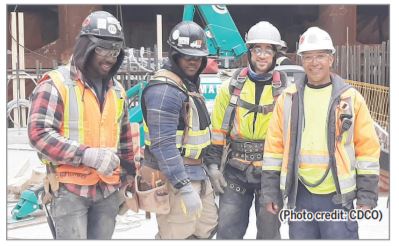The Carpenters’ Union
celebrates Black History Month
TORONTO – This February, people across the North America celebrate Black History Month (BHM). This year marks its 26th celebration in Canada. The Carpenters District Council of Ontario (CDCO), one of the largest skilled trades unions in Ontario, is doing its part to promote awareness of BHM on job sites across the province.
The CDCO recognizes the importance of building a diverse, equitable and inclusive workplace environment for all workers. On Tuesday, the Union, headed by Mike Yorke, President, together with Tony Iannuzzi, Executive Secretary Treasurer, released a statement to start off the month saying: “The Carpenters Union commits to standing up for the rights and dignity of our members in all our communities”.
The Corriere interviewed Chris Campbell, the CDCO’s Equity and Diversity Representative (and now Vice President of Local 27), to discuss the Union’s plan to promote BHM.
How does the union aim to celebrate and honour the legacy of Black Canadians, past and present, including Black Labour Leaders that paved the way in this industry?
“By sharing the Union’s message around Black History Month on social media, throughout the community and on jobsites, our members and prospective members will be able to share the expressions of celebration the Carpenters union has for Black workers and workers of colour. I am grateful to all the Black leaders who went before us. As a union, the diversity of our membership is one of our biggest attributes and proudest legacies.”
The journey, to this point, I am sure has not been easy. People of colour still face discrimination and hateful acts of violence within the industry. How does the Union propose to effect positive change?
“Yes, unfortunately. Change does not come easy. As the CDCO’s Equity and Diversity Representative, I am committed to encouraging and promoting opportunities of equity, inclusion and diversity within the construction sector. One of my tasks is to promote the Union to BIPOC (Black, Indigenous, People of Colour) individuals not only in the greater Toronto Area but also in northern remote communities of Ontario. A greater representation of different cultural groups that reflect their local communities could lead to a better workplace environment and also help support economic prosperity.”
Last year, the Union collaborated with the City of Toronto and other stakeholders within the construction sector to create the City’s Declaration of Inclusive workplaces and Communities. How has this changed the dynamic on the jobsite and in the workplace?
“We believe this has made a difference. Now, there is more dialogue among union staff, members, contractors, etc., that anti-Black racism and any form of discrimination is unacceptable. Unions recognize this is a serious issue and are in the process of improving the language in the collective agreement that could be considered as condoning racism and discrimination. It may not change everything, but it reinforces the message that unions will not stand for such behaviour from individuals.”
Part of the Union’s core values is to stand up for workers and challenge racism, sexism and unjust treatment of their members? How does the Union maintain these values and support its members?
“It requires a collective effort to enact change. The Union is working to better educate its members on creating safe and equitable work environments for all individuals. Currently we collaborate with a third-party company to provide anti-racism training for our staff and shop stewards. We expect that program will eventually be available to all members. We are also developing our own courses to deliver similar training, in line with national standards, and mentorship programs to members within the trades. Our emphasis is on improving diversity and inclusion across the industry. As our organization continues to evolve, we aim to affirm our standard of “practicing what we preach” by also achieving a balance of diverse member representation cross the industry.”
P. Pajdo is a Local Journalism Initiative Reporter

